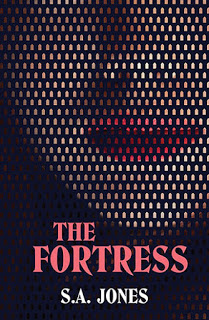‘The Fortress’, S.A. Jones
I was intrigued to read about ‘The Fortress’, a new novel said to explore the concept of challenging misogyny and male oppression of women through exposure to a society dominated by women. My interest was further heightened by very complimentary and promising reviews in the Readings Monthly and other reputable online sources. One reviewer even suggested that it was the best Australian novel of the decade.
Not being familiar with the book’s author, S.A. Jones, I googled her and discovered that she has written for several impressive mainstream and literary publications, and has published several books to critical acclaim. If that and her PhD in History from UWA were not enough, I discovered that she had been named as one of Australia’s 100 women of influence.
Consequently, I was anxious to read ‘The Fortress’, and secured it online in ebook format.

Although I have just finished reading the book, I have thought long and hard about it over the days that I dipped in and out of it. Unfortunately the sense that I continue to be unable to shake is that I have read pornographic fantasy pulp fiction.
The story in a nutshell is about Jonathan, a male business executive who has drunken sex with an intern at a staff function where he also fails to report a sexual assault or help the victim, who later suicides. He is presented as a man who is comfortable in a society where women are demeaned and exploited. On finding out about Jonathan’s work party sex, Amalia, our character’s pregnant wife, tells him that she is only willing to consider a reconciliation if he agrees to become a supplicant in a walled all female Vaik community where men from the outside are only admitted to labour and sire children under the condition of strict and complete subservience to the Vaiks. For less than convincing reasons Jonathan agrees to spend 12 months with the Vaiks. The book describes in great detail how his will is broken and how he comes to grips with being subservient to and used sexually by the Vaik women.
While I suspect that the book’s repeated descriptions of male genitalia and sex acts may be intended to present the female equivalent of male pornographic writing, I found these repeated passages to be crude, unnecessary and seemingly gratuitous. An illustration of this is the manner in which the book presents Jonathan’s crude education, is described by Jonathan himself as he gains an appreciation of how women must feel to agree to have unwanted sex, when he does not object to being sodomised on the orders of a Vaik. That the Vaik, who are perceived to rid men of their misogyny, are also engaged in crude sexual and physical abuse of men expressly for their own sexual gratification, appears to simplify the equation to one of — if a man sexually and otherwise abuses women, women need to dominate and sexually abuse that man in order for him to stop abusing women. I do have some problems with this unconvincing and unoriginal solution.
While the general premise of the book is so promising, even as a novel the storyline has too many holes for it to be more than a basic sketch fantasy stereotype. In some ways the book reads like an early draft with an unnecessarily unbelievable and underdeveloped plot and simplistic dialogue. For instance, the Vaik who are central to this story, need to become a believable society much like those found in good science-fiction and fantasy writing.
I continue to look for what I missed, and hope that someone can help me appreciate the book I just read, as I cannot believe that this acclaimed author would be content with it being published. But in the meantime I cannot possibly recommend a book that I currently feel inclined to delete.